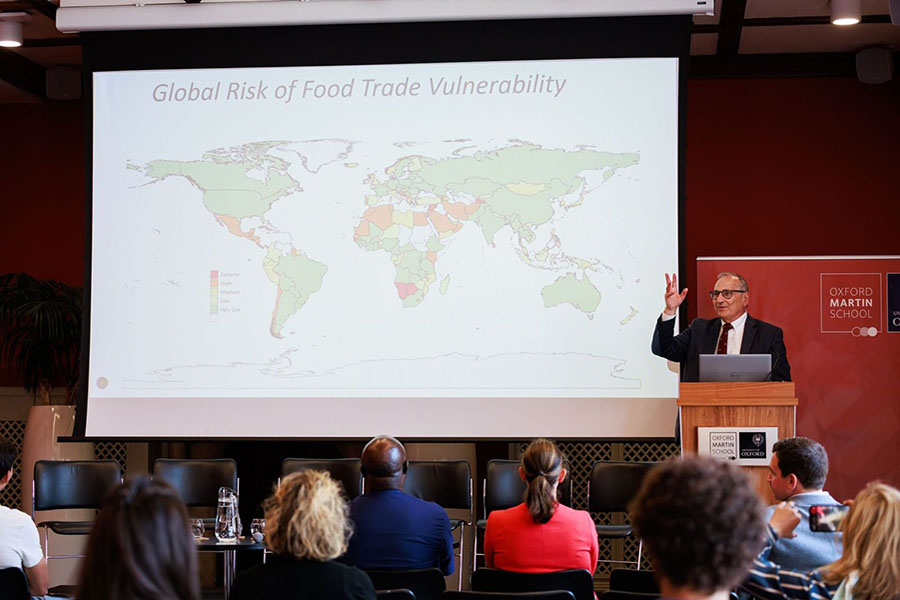
MIT CS3 Research Scientist Kenneth Strzepek delivered the keynote address at the inaugural Jameel Index for Food Trade and Vulnerability Forum, highlighting the value of the index in assessing country-level food security risk. (Source: University of Oxford)
Jameel Index for Food Trade and Vulnerability launched at UK forum
Keynote address by MIT CS3 Research Scientist Kenneth Strzepek highlights value of index in assessing country-level food security risk
MIT Center for Sustainability Science and Strategy Research Scientist Kenneth Strzepek delivered the keynote address at the inaugural Jameel Index for Food Trade and Vulnerability Forum on June 17 at the Oxford Martin School, University of Oxford. Co-hosted by the Abdul Latif Jameel Water and Food Systems Lab (J-WAFS) at MIT, the University of Oxford, the International Food Policy Research Institute (IFPRI), and the Food and Climate Systems Transformation (FACT) Alliance, the Forum marked the official launch of the Jameel Index for Food Trade and Vulnerability—a new analytical framework for assessing countries’ exposure to disruptions in global food trade systems.
The foundational project of the J-WAFS-led FACT Alliance, the Jameel Index (JI) is a data-driven, online tool that enables decision-makers and investors to assess risks posed to food trade by climatic, economic, population, geopolitical and other co-evolving global changes, and how those risks may impact food security at the national level.
“While there exist databases on different components of these complex interactions, there is a pressing need for a more holistic understanding of the dynamics of food trade and how global change will impact food trade and security,” said Strzepek. “Put simply, there is a need for a comprehensive understanding of who is trading with whom and what factors will impact the availability, access, stability and sustainability of that food trade.”
To that end, the JI estimates five “meta-indicators” of food vulnerability—food import dependency, feed import dependency, foreign exchange, supply chain reliability, and supply chain robustness—for eight major traded crops. Scores for each meta-indicator are: 1 -Very Low, 2 - Low, 3- Medium, 4- High and 5- Extreme; the greater the score, the greater the vulnerability. The JI is a composite index of all five meta-indicators.
“The JI aims to generate new knowledge, train the next generation of researchers and policy analysts, and support local capacity building to enable the use of the tools developed by this research for national-level planning in the priority countries in this project,” said Strzepek.
Using the JI, FACT Alliance researchers have already produced some notable findings, he noted. For instance, nearly half of all nations have medium to high food vulnerability, and food imports are a major contributor to food security for upper-middle- and high-income countries. Next steps for the JI include developing mission-specific applications, and adding new meta indicators focused on nutrition and sustainability.
Watch video here (keynote starts at 14:20).
Strzepek is also a senior research fellow at IFPRI; visiting fellow at the Oxford Martin School; climate, water and food specialist at J-WAFS, and Professor Emeritus at the University of Colorado.
